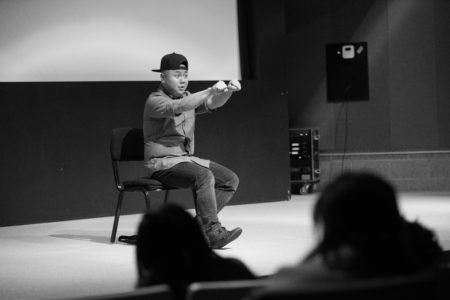By Candace Mettle
fregerha17@grinnell.edu
On Wednesday night, the Asian-American Association (AAA) kicked off Asian-Pacific Heritage Month by hosting slam poet Kit Yan. Yan performed his “Queer Heartache” show, which covered topics on his identity as a trans man of color, sexuality, family and of course, love. Queer Heartache has been on the road for over a year.
Ruth Wu ’17, Jin Chang ’18 and Esther Yoojin Hwang ’19 sit on the executive board of AAA and worked for six months to bring Yan on campus. Asian-Pacific Heritage Month officially takes place in May, but due to the College’s year ending in May, the organization finds it best to begin it in the end of April.
Queer Heartache is a collection of poems written and edited over roughly ten years. Yan began the night by performing a set of poems about his experience growing up in a poor, ethnically Chinese-Hawaiian family. Specifically, Yan recalled the time when his mother wondered if she should get Yan braces because other children had them. Yan understood their economic situation, so protested it.
“You don’t need straight teeth to talk a story,” Yan said in the performance.
Yan then shifted the topic from poverty and the tension of fitting into the American identity to exploring gender and his first sexual encounters as an openly-queer person. From there, Yan went into detail about his relationship with his little brother, separated in years by at least a decade, and his family structure before and after Yan came out as queer and trans.
The performance ended with a humorous take on Yan’s first experience cutting his hair after undergoing his transition. After retelling a bloody mishap with an electric shaver, the tone of the performance turned dark as Yan connected his reluctance to go to the doctor after the accident to the unexpected death of his father when Yan was young.
Due to the ethnicity and inability for his parents to speak English, the hospitals in his hometown did not take his father’s health concerns seriously. Yan believe it reflected the tendency for people to undervalue people of color, especially those who are not fluent in English. After his father’s death, Yan’s mother stressed the importance of him to learn English. Yan in turn realized the value he had within his family structure.
“I moved to Chinatown, just to be closer to his memory; I moved to Chinatown to honor my mother,” Yan said. “They killed my father long before he got to the hospital. And they will call us Chink and let us die in the street if we do not remind ourselves of the strength in our own tongues of the resilience our resistance and our own language.”
Language barriers still exists between Yan and his mother, among misperceptions and confusions about mental health and gender, still exist. However, Yan and his family has made many strides to understand each other.
After the performance, Yan allowed for a Q&A session with the audience. Attendees asked questions regarding language, becoming comfortable in queerness, and the craft of writing.
For more information on Yan, visit his website, kityanpoet.com

























































